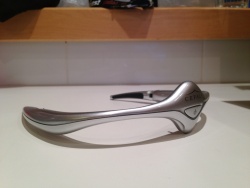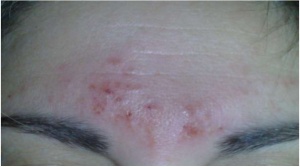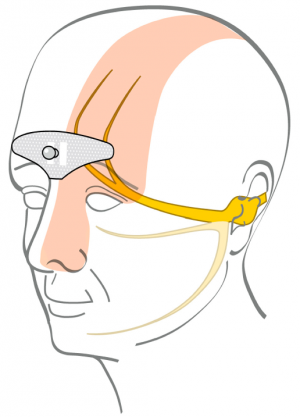Cefaly
From HCE Wiki - The Human Cognitive Enhancement Wiki
| CEFALY | |
|---|---|

|
|
| Category | Head-mounted devices |
| Developer | STX-Med |
| Announced | 2014[1] |
| Released | Consumers: 2015[2] |
| Price | 299 USD |
| Weight | 45.4 g [3] |
| Dimensions | mm |
| Controls | smartphone |
| Standalone[4] | |
| http://www.cefalytechnology.com/en/company | |
| http://www.cefalytechnology.com/en/products | |
Cefaly is head-mounted wearable developed in purpose to treat migraine.
Contents
Main characteristics
Purpose
Company & People
STX-Med company
Founders:
Pierre Rigaux
Pierre-Yves Muller
Important Dates
2004 - Foundation of STX-Med, which was later named Cefaly.[1]
Ethical Issues
Health Risks
Right on the official page of Cefaly side effects are stated.[2] Company claims, that side effects appear in 4,3% of patients, mentioning most common as intolerance to the feeling of Cefaly on the forehead (1.25%), sensation of fatigue during and after the session (0.65%), headache after one session (0.52%), or irritation of the skin on the forehead (0.22%).

Skin irritated probably because of electrode gel containing acrylate.[5]
Enhancement/Therapy/Treatment

Electrode sends electric current through skin and affects trigeminal nerve.[5]
Public & Media Impact and Presentation
Cefaly has its own official facebook page since 2009, and after this, several pages about Cefaly for specific countries were created.
Public Policy
Announcement about approving migraine treat
Related Technologies, Project or Scientific Research
References
- ↑ FDA approves device to treat migraine headaches: http://articles.latimes.com/2014/mar/11/science/la-sci-sn-fda-approves-device-to-prevent-migraine-headaches-20140311
- ↑ Cefaly Technology release: http://www.biospace.com/News/cefaly-technology-release-10000-u-s-migraine/361631 (retrieved Jan 28, 2016)
- ↑ Cefaly® Anti-migrain Device: http://www.amazon.co.uk/Cefaly-Cefaly%C2%AE-Anti-migraine-Device/dp/B009VPAS0M (retrieved Jan 28, 2016)
- ↑ Shows if the device is a standalone wearable computer or if it needs to be connected to a processing unit to function.
- ↑ 5.0 5.1 Magis D., Sava S., d’Elia T. S., Baschi R., Schoenen J., Safety and patients’ satisfaction of transcutaneous Supraorbital NeuroStimulation (tSNS) with the Cefaly® device in headache treatment: a survey of 2,313 headache sufferers in the general population http://www.ncbi.nlm.nih.gov/pmc/articles/PMC4177534/